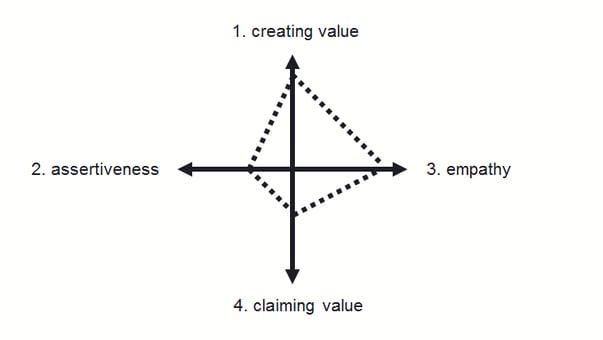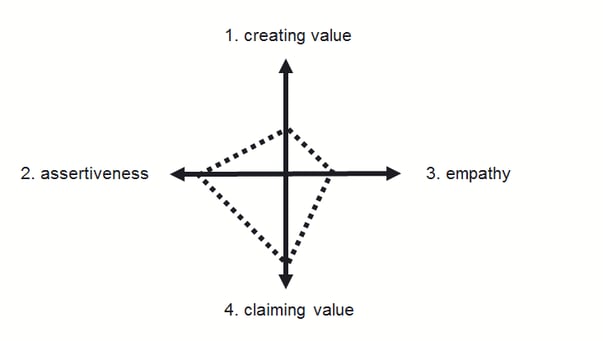
This article was originally published on LinkedIn Pulse.
Improvement in any realm requires tracking and evaluating your performance. That's true in the gym. And it’s true for negotiation, as well.
I pushed this advice in a post three years ago. I recommended that if you’re serious about enhancing your effectiveness, keep a journal of all your negotiations, large and small. Write down your plans beforehand. Critique them afterwards. Make this a habit, you’re guaranteed to sharpen your strategic skills and enhance your agility.
Learning the right lessons from your negotiation experience is now the cornerstone of all my teaching, in my MBA classroom and in Negotiation Mastery, the new online course I’ve created for HBX, Harvard Business School’s digital learning platform. For both environments, I’ve developed a battery of exercises to instill the habit of clear-eyed, focused self-reflection.
All the performance-related content we cover in a 40-hour course can’t be distilled in the limited space here. But I’m glad to share—for your personal use—a particular tool that many students find helpful. It has three functions. First, is identifying areas where improvement will give you the biggest payoff. Second, is illustrating how problem-solving and interpersonal skills must be aligned to constitute coherent strategy. (The third pedagogical function I’ll mention toward the end.)
Here’s the survey: Rate your relative strengths in respect to four essential negotiation skills. You can gave as many as 7 points to a particular skill or as few as 1. You have a total of 16 points to allocate overall and you must use them all. (Giving more points to one item necessarily means you’ll have to reduce points for something else.) There are no right or wrong answers, of course.
- Capitalizing on opportunities to create value.
- Asserting your interests.
- Understanding the motivations and feelings of other parties.
- Getting the maximum possible in the agreement.
As you probably noted, two of the skills are outcome related: expanding the pie (#1) and securing your share of it (#4). Classic negotiation theory posits that there is a fundamental tension between these two skills. Parties who conceal their interests and priorities miss opportunities to make value-creating trades; on the other hand, negotiators who reveal their preferences unilaterally risk exploitation if counterparts bluff or stone-wall.
In turn, the other two skills—asserting your interests (#2) and understanding others (#3)—describe the relational dimension of negotiation. Many people feel that these are in tension, as well. Making bold demands may stress a relationship, for example, while being overly empathetic might compromise one’s own interests.
I’ve analyzed thousands of responses to this survey. Individual results vary widely. Some people believe that they're very good at one particular skill, but much worse at others. Others are more balanced (though very few give themselves 4 points on each one).
Yet in spite of this variation, results tend to cluster into five different categories. You can think of these as bargaining styles, if you like. That shouldn’t be surprising. It’s logical that means and ends would be connected: how you engage your counterpart should influence the outcome.
If you graph your own responses, a pattern will emerge. Here’s an example of someone who gave the most points to items 1 and 3. It’s the most common profile (though it only represents 30 percent of respondents).

These are people who believe that they are good at understanding their counterparts’ thoughts and feelings. That may explain both their confidence that they are relatively good at creating value, but also their doubts about claiming it.
Contrast that pattern with the profile of someone else who give the most points to items 2 and 4. (Ten percent of respondents fall into this cluster.)

If there’s interest, I’ll put up a supplementary post showing three other kinds of self-portraits, but I want to emphasize several larger points here. First, however you happen to see yourself as a negotiator, most people you deal with likely have a different style, at least to some degree. To succeed, therefore, you must be agile. That means flexing yourself so that you deploy different skills depending on the situation and whom you’re dealing with.
Second, consider how you want to be seen and understood by your counterpart. Their impressions will be influenced by what you do and say. It’s not always easy, but you can appear strong without seeming intimidating—and open without being vulnerable.
Finally, your self-image may not match how other people perceive you. In my teaching, the third function of this test serves as a template for peer feedback. After each simulation, students rate each other using this same model. One person may discover that she is better as self-advocacy than she thought, for example. Someone else may find that he’s not as good at engaging with others as he thought that he was. Both of them can recalibrate their profile and tweak their learning agenda, accordingly.
A post like this simply doesn’t support that kind of peer-to-peer coaching that you’d get in a course, be it in-person or online. (Nor does a book, for that matter). But if in your work you ever negotiate as part of a team, you surely should pair up with a colleague to exchange candid and constructive advice. Build on what you do well naturally and focus on areas where there is greater room for improvement.

About the Author
Professor Mike Wheeler's current research focuses on negotiation dynamics, dispute resolution, ethics, and distance learning. He is the author or co-author of eleven books, and his self-assessment app—Negotiation360—was released early in 2015. Additionally, Professor Wheeler's new HBX course, Negotiation Mastery: Unlocking Value in the Real World, is now accepting applications.







